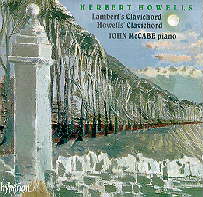|
<< -- 5 -- Wilfrid Mellers

Although Howells was not a particularly prolific composer, he displays
in all his best work this faculty for intermittently revealing the heights
and depths of tragedy. This may happen not only in a monumental work like
Hymnus Paradisi, but also in the small-scale pieces that are more
typical of him. The most affecting example is the suite of keyboard pieces
that Howells called Lambert's Clavichord, written for the obsolete
instrument reconstructed -- at a time when the vogue for 'early'
instruments (and collaterally for fairly early music) was burgeoning --
by Herbert Lambert of Bath. Howells wrote the work in 1927, basing it on
the models of the keyboard pieces of Elizabethan and Jacobean composers
whose work was bequeathed to us mostly by way of the Fitzwilliam Virginal
Book. I can recall how, as a schoolboy in my early teens, I was enraptured
by Howells's pieces -- and still more by the original keyboard
works of the multifarious Byrd, the adventurous and sometimes bellicose
Bull, and by the fragrant Farnaby, unusual (then) in being almost exclusively
a keyboard composer. For me, as for Howells, going back to 'old'
England was a way of hearing and seeing anew. A CD which is not mint-new
but was issued a few years ago (on Hyperion CDA66689), may offer
this experience to you, the more so because Howells's re-creation of
the venerable models is here played by a real living composer John McCabe,
not on a clavichord deputising for virginals, but on a modern though not
very grand piano, such as you've probably got in your parlour.

Continue >>
Copyright © 17 November 2002
Wilfrid Mellers, York, UK

|

